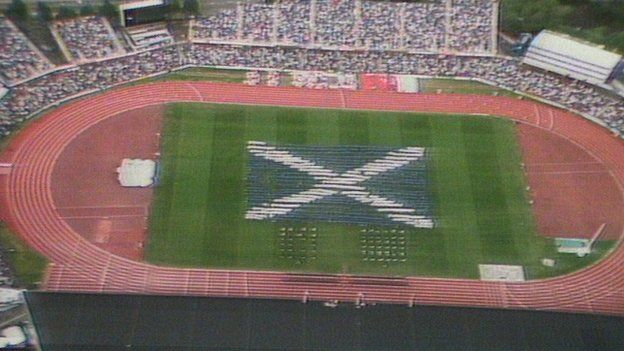The good and bad of Commonwealth Games
- Published

Scotland will host the Commonwealth Games for the third time next July. The previous two Games, both held in Edinburgh, were very different.
The next time you enjoy a drink after 10pm, you may want to raise your glass to the success of the 1970 Commonwealth Games in Edinburgh.
It is seen as one of the most successful games ever and it was a games of many firsts.
It was the first time the photo finish was used, the first time metric rather than imperial measurements were used, the first time the games were called the Commonwealth Games rather than the British or Empire Games.
But perhaps one of the little-known legacies of the 1970 games is that the licensing laws were changed to allow athletes out for a pint after normal closing at 10pm.
It was such a success that eventually the law was changed.
Councillor Eric Milligan was a teenage spectator in 1970 and leader of Lothian Regional Council in 1986 when the games returned to Edinburgh.
"I think in 1970 there was a sense in which Edinburgh was breaking new ground, and there was a real buzz," reflected Councillor Milligan when I visited him at the city chambers.
"The tingle was partly about 'will our athletes be able to rise to the occasion?'.
"I think there was a real feeling of excitement that turned to pride.
"I think it helped in some ways to consolidate Edinburgh's status as the capital city of Scotland, and certainly enhanced Edinburgh's international influence."
One of the athletes who did rise to the occasion was Lachie Stewart. In a nail biting race Stewart swept aside the clear favourite, Australian Ron Clarke, to take a stunning gold in the 10,000 metres.
"Being in Scotland it was like the Olympics, the Brits pulled everything out," said Lachie.
"Personally I had pulled the stops out and did a bit more training.
"I worked at the dental hospital at the time and I started running to my work, back and forward.
"I only started doing that about March and the games came along in July and August and most people thought I'd being doing three times a day for years."
Scotland enjoyed a creditable medal haul, coming fourth out of more than 40 nations.
The games came back to the city in 1986.
There were high hopes for another highly-successful games but second time round it was a very different story.
One of the highlights for the home crowd was watching Dundee's Liz McColgan winning gold in the 10,000 metres, something journalist Derek Douglas remembers well.
"I didn't actually see it, I was in a pub near the stadium. But we could here the cheers from inside, it was quite incredible," explained Derek, who is the co-author of 'The Unfriendly Games'.
As we walk round the track at the Meadowbank stadium where McColgan won her gold Derek explains how the games nearly did not happen.
He says: "In 1970 when Edinburgh hosted the Commonwealth Games pretty much the only thing they had to think about in terms of raising the cash was the money for the beer and sandwiches.
"By 1986 it was always going to be much more costly to put on the games but the crucial problem that the organisers had was that the Thatcher Government at the time refused to put any money into the games."
The main problem for the 1986 games was the fact that more than half the nations boycotted the games in protest at the British government's position on apartheid.
That meant fewer broadcasting rights and a drop in sponsorship.
It meant there were fewer athletes and their supporters in the city, a huge hit to the local economy - soon the games went bust and drifted into millions of pounds worth of debt that took years to recover from.
Douglas says: "In 1986 the whole climate had changed. On the track the games were a success and there was no question about that, but there was all the behind the scenes bickering and the cash shortfalls."
Legacy is the key to any major sporting event on the scale of the Commonwealth Games, justifying huge investment and running costs.
And if you visit the newly refurbished Commonwealth pool in Edinburgh, few would doubt the benefits it has brought to the city.
It is a legacy of the games of 1970 and 1986 and it is going to be a venue for the diving as part of Glasgow 2014 games.
There are certainly many lessons to learnt from the games of '70 and '86 good and bad - and everyone wants the games of 2014 to be remembered for all the right reasons.